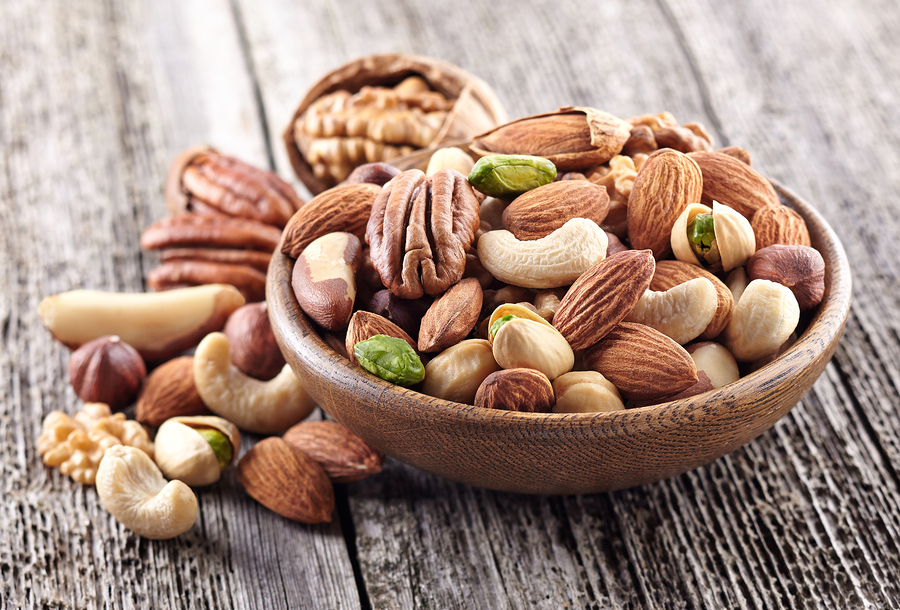- Make It Yourself Lavender Heart-Shaped Bath Bombs!
- 20 Things You Never Knew About “Down There”
- 12 Best Foods For Those Suffering From Arthritis Pain
- 12 Personal Hygiene Mistakes Almost Everyone Makes (Mom Never Told You About #4!)
- 15 Medicinal Plants And Herbs From The Cherokee People
- 12 Mind-Blowing Benefits Of Drinking Coconut Water During Pregnancy
- 12 Outstanding Winter Foods That Won’t Fatten You Up Like A Christmas Turkey
Let’s Get Nutty!

Photo credit: bigstock.com
What kind of nuts should I eat?
- Walnut is one of the healthiest types of nuts. This common variety of nut is absolutely packed with nutrients essential to maintaining optimal health. Walnuts are a plentiful source of melatonin, vitamin E, and healthy omega-3 fatty acids which help ensure brain health. They are also a good source of particular antioxidants which are difficult to find in most foods. These include polyphenols, which protect the liver, and other compounds which fight inflammation and boost endothelial function.
- Macadamia nuts are particularly healthy. Macadamia nuts are high in certain B vitamins and are rich in minerals like magnesium and manganese. A single serving of macadamia nuts contains nearly 60 percent of the daily recommended intake of manganese Another benefit of macadamia nuts is how high in healthy monounsaturated fats they are. Macadamia nuts contain a particular kind of healthy fat called oleic acid. This compound is also found in olives, plays a role in lowering harmful LDL cholesterol levels, and contributes to better cardiovascular health.
- Pecans are another good option. This particular nut offers 19 different vitamins and minerals and also provides plenty of good fats.
- Brazil nuts offer many of the benefits already listed, as well as a generous amount of selenium.
- Almonds deserve a special mention. Almonds are a good source of protein and carbs. They also have a lot of magnesium, which assists in stabilizing blood sugar levels. Like the other nuts, they are high in beneficial fats, but there are some unique qualities of almonds that deserve mention. Almonds have a lot of omega-3 fatty acids, like all the other nuts mentioned here, but they also include a fair amount of omega-6 fats. The modern diet in many industrialized countries is filled with processed foods which are high in omega-6 fats. The imbalance between omega-6 and omega-3 fats is a contributor to many diseases. Take this into consideration if your diet is already deficient in omega-3 rich foods. You may want to start with some of the other nuts first and add more omega-3-rich foods before you start eating almonds regularly.
A quick word about peanuts
Now some of you are probably thinking “But I eat nuts all the time! My candy bar is packed with peanuts!” We hate to be the bearer of bad news, but peanuts aren’t that great for you. In fact, they’re not even nuts. Peanuts are technically part of the legume family, along with peas and beans.
It’s not that peanuts are unhealthy, per se. They are cheap source of protein and calories, and do have a lot of the same nutrients as true nuts. Unfortunately, they are frequently covered with sodium, and are often contaminated by mycotoxins and pesticides.
Peanuts also have the same problem as almonds, in that they too are high in omega-6 fats. People trying to improve their health might want to choose from the different nuts listed above.
READ ALSO: 3 Cancer-Fighting Nuts Video
One of the great things about nuts is that there is so much variety. With so many health benefits and different varieties to choose from, you just can’t lose. If you’re looking for a new guilt-free snack, go on – go nuts (har, har).
References:

































Anto
Oct 21, 2016 at 4:01 pm
I’ve read elsewhere that natural salt is actually healthful, especially rock salt such as Himalayan RS, sea salt is probably contaminated with whatever finds its way into the ocean.
Penobscot
Oct 22, 2016 at 9:58 pm
Your right about that. Himalayan I understand has other minerals and has a very pleasant
and mild taste. I use it all the time.